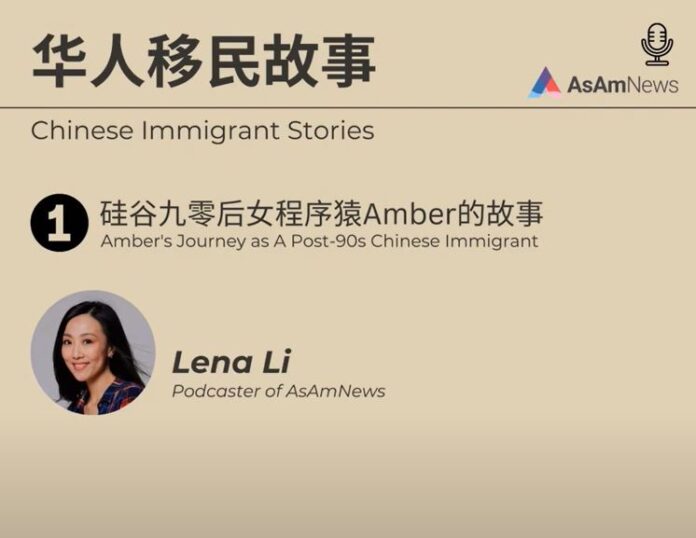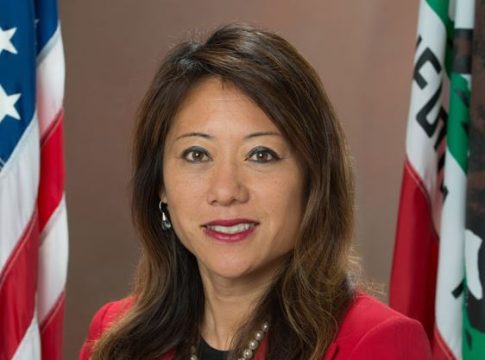By Lena Li
Podcast Introduction:
Welcome to the Chinese Immigrant Stories Podcast. I am Lena, the host. This podcast shines a light on the struggles, hardships, successes, and everyday life experiences of the Chinese immigrant community. Through real stories, we showcase the journey of each immigrant pursuing their dreams in a new land. Whether you are just arriving in the United States, starting a new life, or have been living on this land for many years, rooting in this country and calling it home, this podcast is a space for us to share and listen to each other’s stories.
Ep.1 Amber’s Journey as a Post-90s Chinese Immigrant
Description:
LATEST STORIES
In the first episode of Chinese Immigrant Stories, we dive into the personal journey of Amber (alias), a post-90s Chinese immigrant female software engineer making her mark in the heart of Silicon Valley. With a dual role at a renowned tech company and pursuing a PhD, Amber shares her unique experience as a first-generation tech elite immigrant who’s rooted herself in the Bay Area as a new Chinese American.
Bullet Points:
01m 05s: Amber’s bio
01m 38s: A typical day of Amber
02m 23s: Amber and Kendo
02m 55s: Amber’s American academic journey
04m 35s: How does it feel like to be a female software engineer in Silicon Valley?
06m 07s: the change of Amber’s lifestyle
06m 59s: Chinese immigrants and the H1B
08m 08s: Being single in the US
09m 02s: Rooted in the US
09m 30s: Ending – “let it be”
Podcast Content:
- Lena:
In Silicon Valley, immigrants constitute 69% of the high-tech workforce, with Chinese immigrants comprising approximately 14%. According to the latest data, women represent only 27.6% of the technology industry in the United States, suggesting that the proportion of Chinese women in the technology sector is even lower. Today, I’m going to share with you the story of Amber, a post-90s female software engineer who immigrated from China.
Amber comes from Sichuan, China. After graduating from high school, she came to the United States to complete her undergraduate and master’s degrees. Currently, she is pursuing a doctoral degree in education and simultaneously works as a software engineer at a well-known technology company in Silicon Valley. Since immigrating for work in 2017, Amber has been residing in the Bay Area. Like many new immigrants in talent-rich Silicon Valley, Amber faces various challenges in her work, studies, and adapting to a new lifestyle. Today, let’s take a glimpse into the daily life of Amber, a post-’90s female tech worker in Silicon Valley.
- Amber:
Actually, I feel like my day is quite routine. When I can’t work from home and have to go to the office, I usually have breakfast in the company cafeteria. It’s a very typical American breakfast – coffee, a bagel, and cream. I try not to schedule any meetings in the morning as my mind is clearer then, so I use that time for some solo brainstorming. In the afternoon, I have meetings and write code. I usually leave the office around six o’clock. Occasionally, I attend some networking events, but lately, with the economy not doing so well, at least from the last event I attended, everyone seemed quite nervous and subdued. Even if startup founders or CEOs were present, it felt like the main focus was on raising money, making it difficult to see anything particularly innovative.
- Lena:
In the midst of busy studying and working, Amber has been practicing Japanese Kendo. From being a novice in Kendo to representing the Bay Area in the national Kendo league, Amber has found her own happiness in this sport.
- Amber:
I now train four times a week. Regardless of whether I feel I’ve trained well or poorly on any given day, or whether I’ve been hit a lot or hit others a lot, I always feel like it’s quite a process to experience ‘flow’. It’s like I approach it with a craftsmanship mentality, treating it as something I craft myself.
- Lena:
Amber’s undergraduate major is Philosophy, her master’s degree is in Computer Science. Currently, her doctoral research topic is in Education. In seemingly unrelated interdisciplinary fields, Amber has realized the interconnectedness of all things in the universe.
- Amber:
Studying, especially now that I’ve chosen to study while working, is actually a necessity for my intellectual freedom. As an international student, I was in a very naive state when I applied for my undergraduate studies; English was truly my second language back then. It’s not that it posed an obstacle, but there was indeed a significant difference in language, context, and ways of understanding compared to the native language and thought processes. The entire experience of studying abroad, from the application process to coming here for studies, was also transformative for me.
My current research focuses on Chinese high school students who are preparing to apply for undergraduate studies in the United States. During the application process, some students participate in a paid research program called the Background Promotion Project. This whole experience was completely new to me at the time. I’m particularly interested in their retention rate because I’ve noticed that many students who participate may have spent tens of thousands of RMB, but they drop out midway or stop submitting assignments. My research essentially explores student engagement or learning experience, their experience in the course, or whether they feel they have learned something. On a broader scale, it delves into student consumerism or knowledge consumerism.
Previously, conducting research would take at least six months, a year, or even longer. Now, students can complete such a learning experience in two months. Of course, this presents various issues, so I’ve chosen to delve deeply into related issues from this perspective.
- Lena:
In the Silicon Valley tech industry, where men still dominate, as a new immigrant born in the 1990s, Amber has her own insights into women’s career development in the Bay Area.
- Amber:
To be honest, I don’t think career development in Silicon Valley needs special attention to gender. Take the profession of software engineering, for example. There are clearly defined stages, paths, patterns, or methods for career advancement. In companies, especially large ones, your advancement path is already planned out. Your manager will tell you, or your HR will clearly explain, what skills you need to move from one level to another, in your current status, how they can help you, or what you need to do. If we must categorize by gender, I believe women have a stage related to childbirth in their career development. Among my friends who are also software engineers, whether they’re first-generation immigrants like me or second or third-generation, more or less, they all tend to choose either to have children early or later, around the age of thirty-five or six. I am indeed the only woman in our work group. I don’t place too much emphasis on my gender, of course. However, I have noticed some innate traits in women, such as empathy. I may be someone who is more willing to express myself, and I don’t think too much about it. During work, whether it’s with colleagues or mentors or friends, they used to advise me not to talk about my feelings, but to objectively describe what happened. I can describe something without using feelings, right? But I have to acknowledge and accept my feelings. At least for me, I trust my intuition.
- Lena:
Having lived in the Bay Area for 6 years, Amber’s lifestyle has undergone some changes.
- Amber:
Now I live alone, whereas before, I always had roommates. Living alone, I find cooking to be a bit of a challenge. Back when I was living in China, I found takeout to be very convenient, as well as cheap. But here in the Bay Area, when it comes to food, if I want to outsource it, it’s quite a significant expense for me. Others might use the word “convenience,” but I would use the term “Instagramification” – “instant feedback,” perhaps. In Silicon Valley, where everyone is primarily focused on work and hustling hard, you’ll find that without a car, it’s nearly impossible to go out. I think this results in fewer opportunities to make friends; someone like me, who tends to be more of a homebody, might rarely meet new people. My life revolves around work, Kendo, and studying. There are also some side projects I’m working on. Slowly but surely, I’ve developed my own ecosystem.
- Lena:
Like many Chinese immigrants who come to the United States for work, Amber also went through the process of waiting for an H1B visa. Reflecting on her mindset and emotions at that time, Amber still feels deeply touched.
- Amber:
When I was waiting for the H1B visa, I never really thought about whether I truly wanted to stay in the United States forever. Having a work visa, I think in our Chinese understanding, influenced by each other, is like feeling that my job, my livelihood, may not be secure at any time. Your employer can lay you off for various reasons. In the United States, because you are not a citizen of this country, if you don’t have a valid reason, you have to go back to your home country. For individuals and families, from the perspective of the Chinese context, returning home is considered a failure, right? It’s a kind of elimination. This seems to be an unacceptable outcome. I feel like I’ve worked so hard, learned the language, spent money, studied, and as a person who was once inexperienced and didn’t have much of a plan, I would be affected by this tense mentality. I would feel like I’m just floating along, needing a job every day, enduring unhappiness if it comes. Especially in this economic downturn, with rounds of layoffs, finding a job is not easy either. Now, relying on this H1B visa, my fellow visa holders may feel even more pressure.
- Lena:
Like many individuals born in the 1990s, Amber is quite indifferent when it comes to being single. Despite being far away in China, her mother still occasionally arranges matchmaking events for her in the United States through the strong network of Chinese parents.
- Amber:
For me, being in a romantic relationship is just about 15-20% of my life. It’s not a necessity. So, what do I consider a necessity? It’s a state of physical and mental freedom. Having a goal to work toward is a necessity for me. I do feel some pressure from my family in China, as they might believe that as I get older, if marriage becomes a market, my perceived value might gradually decline. None of my friends around me ever say, “You should be dating.” So, I don’t have any external reminders. I believe that Chinese parents have some sort of superpower. I don’t know how they do it, but I think my mom got pulled into it.
- Lena:
When asked if she considered the Bay Area her home, Amber responded like this:
- Amber:
As I increasingly adapt to life and the rhythm of the Bay Area, I feel that my daily life, including clothing, food, housing, and transportation, is gradually blending more with this place. I think it’s not so much about whether there’s a feeling of “home” as it is about having a sense of being able to put down roots on my own. I’ve already become very accustomed to the rhythm of working in a tech company in Silicon Valley. This has gradually become my comfort zone.
- Lena:
As for the future, Amber adopts a “go with the flow” attitude. Like many only-child families in China, although Amber’s parents would love for their daughter to return to their side, they have chosen to respect her decision to live alone abroad.
That’s all for this episode. I’m Lena. Behind every Chinese immigrant story, there is a brave and resilient heart and families who always support each other with love. Please follow our website platform, asamnews.com.
Subscribe to our podcasts on Spotify Apple Podcasts and YouTube.
AsAmNews is published by the non-profit, Asian American Media Inc. Make a tax-deductible donation of at least $40 or pledge a monthly recurring donation of at least $10 by August 31 and receive a free copy of The Legend of Mu Lan: Heroine of Ancient China, the inspiration for the classic Disney movie. We are supported in part by funding provided by the State of California, administered by the California State Library in partnership with the California Department of Social Services and the California Commission on Asian and Pacific Islander American Affairs as part of the Stop the Hate program. To report a hate incident or hate crime and get support, go to CA vs Hate.











Lena I welcome the opportunity to chat with you. I am by blood a Wong, Lee, and Chan from China. My family has been in America since 1847 and we are responsible for creating the original 10 Chinatowns throughout America. There is a saying that I love that gives perspective to immigration – What the grandfather knows, the son wants to forget, and the grandson wants to remember. One of the most troubling things for those of us who have been in America for multiple generations is the lack of perspective, the lack of historical knowledge of Asians in America. and the lack of knowledge of Asians vs. non-Asians in America. The lacking of these things often renders newbies’ perspectives with a lack of context and therefore reliability. The generation gap has only exacerbated the problem. I’ve helped Gen Xs from Viet Nam who were not even aware that Viet Nam was once French-Indo China. Which is the French has made huge lasting impacts to the Vietnamese culture. This lack of knowledge of their homeland is made even worse in the new land they call home. Asian from, China, Korea, and and elsewhere are all susceptible to these misconcieved perceptions. Hopefully, your podcast can help bridge this cultuatural gap and better enable more Asians to succeed and make their dreams come true in America.
Thank you, Roger, for your unique perspective and insight! I appreciate how you highlight one of the deep-rooted reasons behind cultural gaps. I believe there is much to be communicated across generations, especially with the diverse and evolving digital ways of storytelling nowadays. I hope my podcast can showcase the diversity of Chinese immigrant individuals and groups, spanning different generations and backgrounds, eventually help bridge the gap.
Meanwhile, I’m very curious about your story. If you are willing to share more, pls send me via email: [email protected]